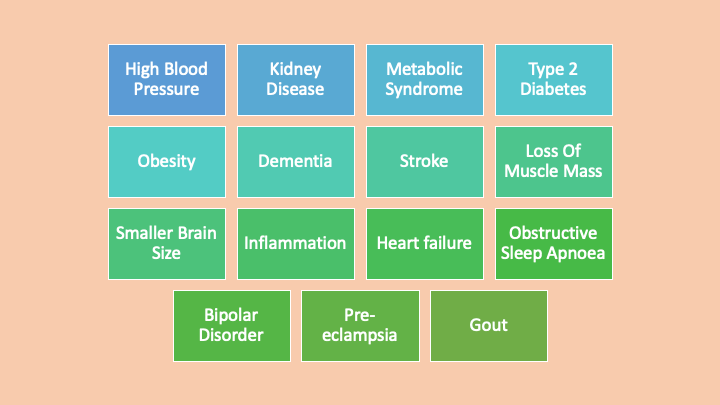Uric acid is a chemical produced by your body when purines break down. Purines are found naturally in the body. Some come from damaged and dead cells when DNA is broken down. They are also found in many food and alcohol.
In this article, I will discuss
- What does uric acid have to do with your brain and blood pressure
- What are optimal uric acid levels
- Natural strategies to reduce high uric acid levels
The problem of high uric acid levels: It’s not all about gout.
You have probably heard of uric acid in relation to gout and kidney disease, but research has drawn attention to the relationship between high uric acid levels and poor heart and brain health and several other conditions.
Gout is a common and complex type of arthritis that can affect anyone. You may experience sudden severe attacks of pain, swelling and redness in one or more joints, most often in the big toe. Gout is caused by the accumulation of uric acid (urate) crystals in your joints, causing inflammation and pain.
Conditions Related To High Uric Acid Levels

How do you test for uric acid?
You can test your blood uric acid levels by getting a serum uric acid or urates test. This is a common test available in most laboratories in the world. In fact, you may have already had the test as a part of your annual workup. Your levels might have been high, but if you did not complain of joint pain, it is likely your doctor suggested that you should reduce your meat and alcohol intake and repeat the test in a year.
Asymptomatic hyperuricemia is the clever-sounding way to say that you have high uric acid levels but do not have any symptoms. High uric acid levels do not have specific symptoms unless you have gouty arthritis or kidney stones.
In gout, urate crystals form when you have high levels of uric acid levels in your blood. Uric acid can build up either because of excessive production or poor excretion by your kidneys.
How high is too high? Normal versus optimal
Normal lab ranges for tests are decided by the average of a group of healthy men and women in an area. The problem lies in defining “healthy”. For uric acid levels, “healthy” is defined by people who do not have gout. But here I am discussing the problem of asymptomatic high uric acid levels.
Functional Medicine doctors like me, look for early indicators of disease so that we can help you take action even before you develop symptoms. We know that dementias like Alzheimer’s Disease develop 20-30 years before you have symptoms. Hence we look at optimal levels instead of just the normal range.
A review article titled Is it time to revise the normal range of serum uric acid levels? says exactly this.
Additionally, men’s average uric acid levels increased gradually from less than 3.5 mg per deciliter (210 μmol per litre) in the 1920s to 6.0 to 6.5 mg per deciliter (360 to 390 μmol per litre) in the 1970s. (Feig 2008, Uric acid and cardiovascular disease).
An article in Scientific Reports, April 2020, looked at uric acid levels and death from all causes. They found the lowest death rates at uric acid levels of 4.0–4.9 mg/dL in both men and women.
Normal lab range for uric acid
Canada Men 208–400 µmol/L (3.5 -6.72 mg/dL)
Women 155–400 µmol/L (2.61 -6.72 mg/dL)
USA Men 4.0-8.5 mg/dL ( 237-505 µmol/L)
Women 2.7-7.3 mg/dL (160-434 µmol/L)
Optimal Uric Acid Levels In Both Men And Women = less than 5 mg/dL (297 µmol/L)
Uric Acid And Your Brain
The foundations of brain health are optimal blood glucose and blood pressure levels and low levels of chronic systemic inflammation. Uric acid affects all three foundational areas, either directly or indirectly.
Uric acid and hypertension:
High uric acid levels can cause hypertension because of its harmful effects on the kidneys, but there are additional mechanisms, as detailed in an article from Hypertension Research. Uncontrolled blood pressure is bad for your brain. However, the most important question is whether reducing uric acid levels lowers blood pressure? The answer is YES!
In a study in the journal JAMA, adolescents (aged 11-17 years) with hypertension and serum uric acid levels ≥6 mg/dL, and not on any anti-hypertensive medications, were treated with Allopurinol, 200 mg twice daily for 4 weeks. Allopurinol is a medication used to treat gout.
At the end of the study period, the researchers found that those on Allopurinol had a reduction in systolic blood pressure (the upper number) of 6.9 mm Hg and 5.1 mm Hg for diastolic blood pressure (the lower number). There was a reduction in uric acid levels as well.
Uric acid and dementia:
We know that heart and brain health are interrelated: what is good for the heart is good for the brain. High uric acid levels with or without gout raise the risk of heart disease and stroke. And both of those are bad for your brain.
Uric acid is a natural antioxidant.
What are antioxidants: Free radicals are molecules produced in the body as a result of different processes. High levels of free radicals are extremely harmful to brain and heart health. Antioxidants counter the effects of free radicals so that they cannot cause harmful effects. Fresh vegetables, fruit and nuts contain several antioxidants. And hence the recommendation to eat different coloured vegetables and fruit (“eat the rainbow”).
In an article aptly titled Uric Acid-The Antioxidant-Oxidant Paradox, Dr. Richard Johnson, who is a leading authority on uric acid, explains it thus. “Uric acid may function either as an antioxidant (primarily in plasma) or pro-oxidant (primarily within the cell)”.
In his book, Nature Wants Us to Be Fat: The Surprising Science Behind Why We Gain Weight and How We Can Prevent and Reverse It, Dr. Johnson explains that rising uric acid levels could be a protective mechanism for humans. As a part of evolution, millions of years ago, humans lost the uricase enzyme, which helps to process uric acid.
What do studies indicate?
A study on elderly Japanese people concluded, “Elevated serum uric acid levels were independently associated with cognitive deterioration”.
A study in BMC Neurology, found a slight reduction in dementia risk in patients with high uric acid levels, both with and without uric acid lowering treatment.
However, the Rotterdam Scan Study, which looked at brain white matter and uric acid levels, found high uric acid levels were related to white matter atrophy and worse cognition.
A study on people with gout concluded that “Gout was independently associated with a 15% higher risk of incident dementia in the elderly”.
The bottom line is,each person is different. Uric acid is one risk factor. It is very rare to find someone with only high uric acid, without metabolic syndrome, high inflammation or high blood pressure.
Uric acid and Parkinson’s Disease:
Parkinson’s Disease is a brain disorder that causes uncontrolled movements, such as shaking, stiffness and difficulty with balance and coordination. Some studies have suggested that higher uric acid levels may be protective for Parkinson’s Disease progression, considering that excess free radical damage is one of the possible causes of the disease.
A 2009 study found lower uric acid levels in people with Parkinson’s Disease and suggested that the reason could be because uric acid was used up as an antioxidant to counter the harmful effects of free radical damage.
Parkinson’s is a very complex disease. Until studies show that raising uric acid levels (interventional trials) benefits people with Parkinson’s, artificially raising uric acid levels in them would not be wise.
Though it is a complex chronic disease, most people with Parkinson’s Disease do not die of it. They die of pneumonia, dementia and hip fractures. (Thank you, Dr. Raha!)
Therefore using multiple strategies to manage Parkison’s symptoms better and reducing the risk of dementia is more important than focusing on only uric acid.
How Can You Lower Uric Acid Levels?
- Food and drinks
- Prescription medications
Does eating meat worsen your gout?
Most people with high uric acid levels with or without gout are asked to eat less meat because meat contains purines. But clinical studies do not support this recommendation completely.
One study looked at serum uric acid levels in meat eaters, fish eaters, vegetarians and vegans. The study concluded, “Individuals consuming a vegan diet had the highest serum concentrations of uric acid compared to meat eaters, fish eaters and vegetarians, especially in men. Vegetarians and individuals who eat fish but not meat had the lowest serum uric acid concentrations.”
The study was not designed to find out why vegans had higher uric acid levels but suggested that it could be because vegans do not eat dairy products. Some studies have shown the benefits of eating dairy for people with gout.
Though gout is an inflammation of your joints, most of you have features of insulin resistance or metabolic syndrome, along with gout. Insulin resistance is a problem of your glucose-carbohydrate-insulin metabolism. Meat or protein-containing food does not raise your blood glucose levels as much as carbohydrates do.
When you avoid protein-containing food, most of you end up eating more carbohydrates! The result is worsening inflammation, higher blood glucose levels, and more belly fat…..all the things that don’t help your uric acid levels or your brain health!
What about weight loss and uric acid levels?
In a study called, Effects of low-fat, Mediterranean, or low-carbohydrate weight-loss diets on serum urate and cardiometabolic risk factors, the researchers found that weight loss reduced uric acid levels in all patients. However, at the end of six months, those on the low-carb diet had lower uric acid levels than those on the low-fat or Mediterranean diet.
Bottom Line: The best diet is the one personalized to you.
What are the worst liquids for people with high uric acid levels?
The worst liquids for people with high uric acid levels are:
- Fruit juice, fruit smoothies
- Soda (cold drinks)
- Alcohol
Fructose and Uric Acid
Fructose is a sugar present in table sugar, sugar-sweetened beverages, many fruits and processed food containing high-fructose corn syrup. Fructose consumption has been linked to the following :
- High blood pressure
- High triglycerides
- Weight gain
- High uric acid levels
- Worsening gout
- Fatty liver
- Increased appetite
Fructose is like a “stealth bomber”- it does not raise blood glucose or insulin levels but causes mayhem in the liver. If you want to improve your brain health, you have to prioritize liver health.
Is fructose driving Alzheimer’s Disease?
The image below is from the paper Cerebral Fructose Metabolism as a Potential Mechanism Driving Alzheimer’s Disease by Dr. Richard Johnson, whom I had mentioned before. He has devoted many years to researching uric acid and fructose. He is the author of the book, Nature Wants Us to Be Fat: The Surprising Science Behind Why We Gain Weight and How We Can Prevent and Reverse It.
As you can see in the image below, uric acid is made from fructose, and the process also uses up ATP. Our cells need adequate energy to function. ATP is your cell’s energy provider.
Dr. Johnson explains that fructose activates a survival pathway by lowering energy in cells (using up ATP) in making uric acid. The fall in energy from fructose metabolism increases food intake and induces insulin resistance-Nature Wants Us To Be Fat.
But I thought fruit was good for me?
Eating whole fruit versus drinking your fruit as juices and smoothies are very different in terms of metabolic effects. Whole fruits have fibre which tampers down the harmful effects of fructose. Moreover, how often do you eat six oranges at a time? But can you drink the equivalent of six oranges as fruit juice? Easily!
Bottom line: Don’t drink your fruit!
Soda/sugar-sweetened beverages/cold drinks:
In one article of many, in the Journal Of Prevention Of Alzheimer’s Disease, the researchers looked at the consumption of sugar in beverages and the risk of dementia, Alzheimer’s Disease and stroke. Bad news for brain health-Higher intake of sugar in beverages was related to a higher risk of dementia, Alzheimer’s Disease and stroke.
What about alcohol? Does the type of alcohol matter?
We have been told that people with gout should avoid drinking beer. The higher purines in beer may trigger a gout attack. But is wine safer? When it comes to brain health, is there a safe limit on alcohol?
Researchers asked about the quantity and type of alcohol intake among people with gout, whether it was beer, wine or liquor, and the frequency of gout attacks. They found that the higher the alcohol intake worse was their gout symptoms. It did not matter which type of alcohol they drank.
Alcohol and brain: No safe limit.
We know that heavy alcohol use is bad for your brain. But a recent study using the UK Biobank data found that even light-to-moderate drinking was associated with smaller brain size. Light-to-moderate drinking is just a few beers or glasses of wine a week.
In view of this new study, it is likely that scientific and government guidelines for safe drinking will have to change. Guidelines recommend no more than one drink a day for women and no more than two for men, which is higher than the study’s findings.
It is known that some antihypertensive agents, such as thiazide, increase serum uric acid levels, while other medications, including losartan, fenofibrate, and sodium-glucose cotransporter-2 (SGLT2) inhibitors, decrease serum uric acid levels.
Do prescription medications have a role in reducing uric acid levels?
In people with gout uric acid lowering medications like allopurinol or febuxostat are recommended by national guidelines. However, these medications are not usually recommended for people without gout.
Allopurinol or febuxostat? Allopurinol has a better safety profile than febuxostat, particularly for heart health. The FDA has a black box warning for febuxostat.
Losartan for hypertension: In an article in the journal Hypertension, the researchers studied the effects of the antihypertensive medication Losartan in reducing uric acid levels and protecting the kidneys in people with diabetes and kidney damage. They concluded that Losartan reduced uric acid levels and reduced the risk to kidneys.
Switching from hydrochlorothiazide: The American College of Rheumatology Guidelines for Gout, 2020, recommend that if you use hydrochlorothiazide (a water pill) for hypertension, your healthcare provider may consider switching to other medications. However, the guideline recommendations are for people with gout, not for those with asymptomatic hyperuricemia.
SUMMARY
High uric acid levels with or without gout are harmful to your brain and metabolic health.
Uric acid levels within the “normal” range may not be optimal.
Using a lifestyle-first approach will give you benefits beyond your uric acid levels. You can prevent dementia, reduce your risk for heart disease, improve your mood, have lower blood pressure and enjoy higher energy levels.
Additional Resources:
Managing High Blood Pressure: More Than Taking Pills
References
- Anker, Stefan D., et al. “Uric acid and survival in chronic heart failure: validation and application in metabolic, functional, and hemodynamic staging.” Circulation 107.15 (2003): 1991-1997.
- Ryu, Aelie MD, PhDa; Cho, Nam Jun MD, PhDb; Kim, Yun Sook MD, PhDa,∗; Lee, Eun Young MD, PhDb,∗ Predictive value of serum uric acid levels for adverse perinatal outcomes in preeclampsia, Medicine: May 2019 – Volume 98 – Issue 18 – p e15462
doi: 10.1097/MD.0000000000015462 - dos Santos Oliveira, Pedro Miguel, et al. “Serum uric acid as a predictor of bipolarity in individuals with a major depressive episode.” Bipolar disorders 21.3 (2019): 235-243.
- Lanaspa, Miguel A., Ana Andres-Hernando, and Masanari Kuwabara. “Uric acid and hypertension.” Hypertension Research 43.8 (2020): 832-834.
- Feig, Daniel I., Beth Soletsky, and Richard J. Johnson. “Effect of allopurinol on blood pressure of adolescents with newly diagnosed essential hypertension: a randomized trial.” Jama 300.8 (2008): 924-932.
- Feig, Daniel I., Duk-Hee Kang, and Richard J. Johnson. “Uric acid and cardiovascular risk.” New England journal of medicine 359.17 (2008): 1811-1821.
- Desideri, Giovambattista, et al. “Is it time to revise the normal range of serum uric acid levels.” Eur Rev Med Pharmacol Sci 18.9 (2014): 1295-306.
- Konta, Tsuneo, et al. “Association between serum uric acid levels and mortality: a nationwide community-based cohort study.” Scientific reports 10.1 (2020): 1-7.
- Sautin YY, Johnson RJ. Uric acid: the oxidant-antioxidant paradox. Nucleosides Nucleotides Nucleic Acids. 2008 Jun;27(6):608-19. doi: 10.1080/15257770802138558. PMID: 18600514; PMCID: PMC2895915.
- Suzuki, Kazushi, et al. “Elevated serum uric acid levels are related to cognitive deterioration in an elderly Japanese population.” Dementia and geriatric cognitive disorders extra 6.3 (2016): 580-588.
- Verhaaren, Benjamin FJ, et al. “The relation of uric acid to brain atrophy and cognition: the Rotterdam Scan Study.” Neuroepidemiology 41.1 (2013): 29-34.
- Singh, Jasvinder A., and John D. Cleveland. “Gout and dementia in the elderly: a cohort study of Medicare claims.” BMC geriatrics 18.1 (2018): 1-8.
- Schmidt, Julie A., et al. “Serum uric acid concentrations in meat eaters, fish eaters, vegetarians and vegans: a cross-sectional analysis in the EPIC-Oxford cohort.” PloS one 8.2 (2013): e56339.
- Dalbeth, Nicola, and Kate Palmano. “Effects of dairy intake on hyperuricemia and gout.” Current rheumatology reports 13.2 (2011): 132-137.
- Yokose, Chio, et al. “Effects of low-fat, Mediterranean, or low-carbohydrate weight-loss diets on serum urate and cardiometabolic risk factors: a secondary analysis of the dietary intervention randomized controlled trial (DIRECT).” Diabetes Care 43.11 (2020): 2812-2820.
- Yu, Zhange, et al. “The significance of uric acid in the diagnosis and treatment of Parkinson’s disease: An updated systemic review.” Medicine 96.45 (2017). ((PubMed))
- Johnson, Richard J., et al. “Cerebral fructose metabolism as a potential mechanism driving Alzheimer’s disease.” Frontiers in aging neuroscience 12 (2020): 560865.
- Miao, Hongyun, et al. “Sugar in Beverage and the Risk of Incident Dementia, Alzheimer’s disease and Stroke: A Prospective Cohort Study.” The Journal of Prevention of Alzheimer’s Disease 8.2 (2021): 188-193.
- Neogi, Tuhina, et al. “Alcohol quantity and type on risk of recurrent gout attacks: an internet-based case-crossover study.” The American journal of medicine 127.4 (2014): 311-318.
- Daviet, Remi, et al. “Associations between alcohol consumption and gray and white matter volumes in the UK Biobank.” Nature communications 13.1 (2022): 1-11.
- Miao, Yan, et al. “Effect of a reduction in uric acid on renal outcomes during losartan treatment: a post hoc analysis of the reduction of endpoints in non-insulin-dependent diabetes mellitus with the Angiotensin II Antagonist Losartan Trial.” Hypertension 58.1 (2011): 2-7.
- FitzGerald, John D., et al. “2020 American College of Rheumatology guideline for the management of gout.” Arthritis Care & Research 72.6 (2020): 744-760.





